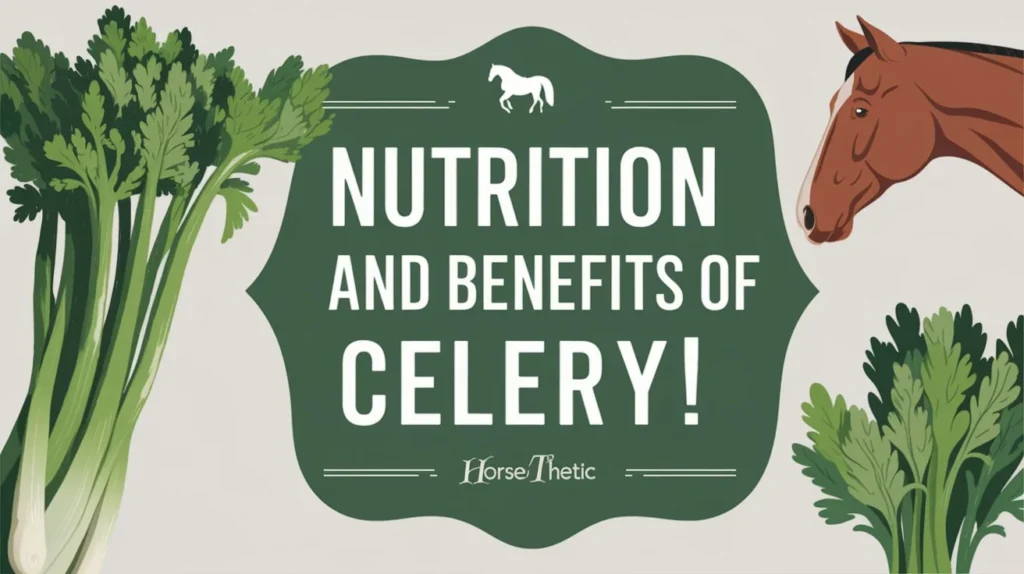Ever wondered if horses can eat celery? It’s a common question among responsible owners who carefully plan their horse’s dietary needs.
However, while celery is beneficial, it should only be given as treats, not a primary feed. Unlike sugary snacks, it has low sugar content, making it a healthier choice.
The Essentials of Horse Nutrition: A Quick Guide
Before diving into the expert opinion about celery, let’s quickly recap the nutritional essentials for horses. A horse’s nutrition is built around plant-based foods, with a focus on forage like grass and hay. As natural grazers, they spend hours in turnout pastures and paddocks, constantly nibbling on grasses to meet their nutritional requirements.
A well-balanced diet includes a steady supply of common hay, grains, and sometimes oral supplements to support high-intensity activities like sport competitions.
While they primarily rely on hays and grains for sustenance, carefully chosen supplements can enhance their meals when needed. Whether a horse is casually roaming or competing at peak levels, a quality feeding plan ensures they get the right balance of calories and nutrients for optimal health.
The Nutritional Power of Celery: Why It’s a Super Snack for Horses
Our Horses love a fresh and crunchy treat, and celery is one of the best options! It’s packed with essential vitamins and minerals, making it a nutritious addition to your horse’s diet. When you feed your horse raw celery in small amounts, it provides incredible nutritional benefits without adding excess sugar or fat.
An 100 – gram portion of celery is rich in fiber and water, helping with digestion and hydration. It also contains protein, carbohydrates, and fat in balanced amounts, ensuring your horse gets a well-rounded snack.
Key Nutrients in Celery for Horses
- Vitamins A, B, C, K – Support vision, immunity, and overall health.
- Phosphorus & Magnesium – Strengthen bones and muscles.
- Potassium & Calcium – Help with nerve function and hydration.
- Fiber – Aids digestion and gut health.
When feeding celery, always chop it into small pieces to avoid choking. It’s a great way to add variety to your horse’s diet while ensuring they consume beneficial nutrients!

Why Celery is a Healthy Snack for Horses: Surprising Health Benefits
When a vegetable has multiple nutritions given above, they imagine health benefits of that vegetable, here are some potential benefits of Celery for Horses
A Hydrating and Digestive-Friendly Snack for Horses
Celery is more than just a low-calorie vegetable—it’s a nutrient-packed treat that can support your horse’s overall health and well-being. It’s rich in water and fiber, making it a great addition to their regular diet of grass and hay.
Not only does it aid in a horse’s digestive system, but it also helps in keeping their gut functioning smoothly. Since horses rely on a high-fiber diet, feeding celery in moderation ensures they receive essential nutrients without disrupting their nutrition.
Beyond digestion, celery provides vitamin A, which is excellent for equine eyesight and keeps their skin healthy. This low-calorie vegetable is also a natural hydration agent, helping horses stay full of water, especially in hot weather or after intense physical activity when they lose a significant amount of water through sweating.
Electrolyte Balance and Bone Strength Support
Celery is a good source of potassium just like meat, an important electrolyte that helps maintain proper muscle function and nerve transmission. Horses rely on muscles and nerves for activities like grazing, galloping, and everyday movement, so including celery in their diet ensures these systems function optimally. Additionally, it contains high levels of phosphorous, which aids in keeping a horse’s teeth healthy and bones strong.
The balance of electrolytes in a horse’s body is crucial for helping muscle and nerve functions, reducing fatigue, and improving endurance.Moreover, celery is packed with vitamin K, which plays a crucial role in blood clotting and bone health. Horses rely on strong bones and healthy blood clotting mechanisms to prevent injuries and maintain overall well-being.
Safely Adding Celery to Your Horse’s Diet: Tips and Tricks
Many horse owners wonder, “Can horses eat celery?” The answer is yes! Horses love the fibrous crunch of this green vegetable, making it a delicious snack when served properly. However, while celery stalks and leaves are safe for horses, improper feeding can lead to gastrointestinal issues, choking, or even behavioral issues. Overfeeding can also negatively affect a horse’s health, so it’s best to serve celery in moderation and in the right way.
Whether you are using bought or homegrown celery, always ensure it’s fresh, organic, and parasite-free. Avoid old, moldy celery, as it can be bad for your horse’s digestive system and may cause stomach or intestinal issues.
Additionally, feeding celery in its whole form is a mistake, as horses cannot vomit due to their digestive tract design, which prevents food regurgitation. This means any food that gets stuck in the intestine or stomach stays there, increasing the risk of choking and other health problems.
Step 1: Cut Celery for Easy Eating
Never feed a horse a whole celery stalk or large celery leaves—doing so can be dangerous. Instead, always cut celery stalks into thin slices, small blocks, or bite-sized snack pieces. This makes swallowing and digestion easier, allowing horses to safely devour their treats without any trouble. If you plan to add celery to a regular diet, ensure the pieces are small enough to prevent choking, yet still large enough for your equine buddy to enjoy.
Step 2: Rinse Celery for Extra Safety
Whether you buy celery from a store or use homegrown stalks, always rinse celery under running water before feeding it to your horse. This helps remove pesticides, salt, and other chemicals that may be present. For extra safety, let the celery dry on a white background to check for any dirt or residue. A clean, fresh snack is the best way to keep your horse healthy!
Step 3: Make Celery More Enjoyable
Not all horses enjoy celery right away—some are fussier and may turn their nose at this green vegetable. In such instances, you can get inventive by making celery more appealing. Try mixing celery into a bran mash, adding a little peanut butter, or combining it with other tasty treats. This not only adds variety but also helps a resistant horse accept the offering and develop a taste for celery. If your horse eats too fast, introducing celery as a slower-to-chew snack can also help manage their eating speed.
Tips for Safe Feeding
- Feed celery in moderation to avoid stomach and intestinal issues.
- A handful of celery stalks is enough—don’t overdo it.
- Never feed huge clumps of celery leaves; always dice them first.
- To prevent choking, cut celery stalks into bite-sized snack pieces.
- Introduce celery occasionally as a snack, not as a main part of their diet.
By following these ways to incorporate celery into your horse’s diet, you can provide a safe, healthy, and tasty treat that your equine buddy will welcome. Repeat these steps every time you prepare celery to ensure the best feeding experience!
Conclusion
In summary, celery is a safe and nutritious snack for horses when fed in moderation. Packed with vitamins, minerals, and hydration benefits, it supports digestion, electrolyte balance, and overall health. However, proper preparation—such as chopping it into small pieces and rinsing thoroughly—is essential to prevent choking and ensure safety.
By incorporating celery as an occasional treat alongside a balanced diet of hay and grains, you can provide your horse with a healthy, crunchy snack they’ll enjoy. Always monitor your horse’s reaction and consult a vet if you have any concerns about dietary changes. Happy feeding!
FAQS
Can horses eat raw celery?
Yes, horses can safely eat raw celery. It’s best served chopped into small, bite-sized pieces to prevent choking. Raw celery retains all its nutrients, including fiber, vitamins, and minerals, making it a healthy snack when given in moderation.
Can they eat the celery leaves?
Yes, celery leaves are safe for horses and contain beneficial nutrients. However, like the stalks, they should be washed thoroughly and chopped finely to avoid digestive issues or choking hazards.
Are there any vegetables horses can’t eat?
While many vegetables are safe, some should be avoided, including:
- Onions & Garlic – Can cause anemia.
- Tomatoes & Potatoes (raw or green parts) – Contain solanine, which is toxic.
- Avocados – Contain persin, harmful to horses
- Cabbage & Broccoli (in excess) – Can cause gas and digestive upset.

